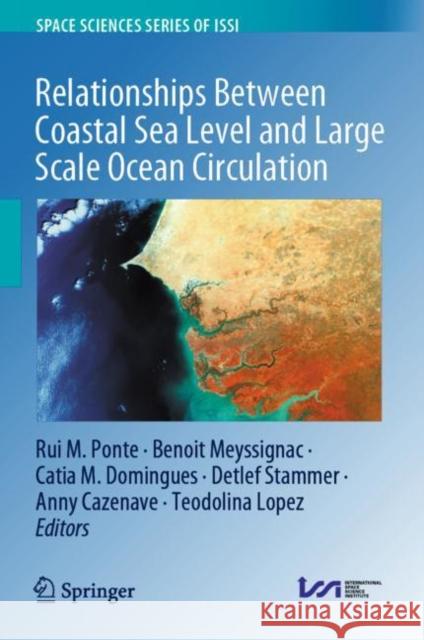Relationships Between Coastal Sea Level and Large Scale Ocean Circulation » książka



Relationships Between Coastal Sea Level and Large Scale Ocean Circulation
ISBN-13: 9783030456337 / Angielski / Twarda / 2020 / 450 str.
Relationships Between Coastal Sea Level and Large Scale Ocean Circulation
ISBN-13: 9783030456337 / Angielski / Twarda / 2020 / 450 str.
(netto: 421,70 VAT: 5%)
Najniższa cena z 30 dni: 424,07
ok. 16-18 dni roboczych.
Darmowa dostawa!
Rui M. Ponte is a Principal Scientist at Atmospheric and Environmental Research, Inc., where he leads the Atmosphere, Ocean & Climate Section. Aside from working extensively on problems related to the modeling and interpretation of sea level variability and change, his broad and multidisciplinary research interests have led him to study the general circulation of the ocean and atmosphere using the angular momentum approach, the intraseasonal variability in the tropical atmosphere and oceans, the effects of the ocean on the Earth’s rotation and gravity field, and the oceanic meridional overturning circulation, among other topics.
Benoît Meyssignac is a research scientist at the “Laboratoire d’Etudes en Géophysique et Océanographie Spatiale” (LEGOS) and at the “Centre National d'Etudes Spatiales” (CNES) in Toulouse, France. His research aims at understanding the variations of the global Earth energy-water cycle (including sea level and mass transfer variations) at regional and global scales through satellite observations and modelling approaches. His efforts have ranged from the development of global sea level products and global mass redistribution products (with associated uncertainties) tailored for robust comparisons with climate models to the detection and attribution of anthropogenic forcing (greenhouse gases and aerosols emissions) and natural forcing (solar variability, volcanic eruptions) in the Earth energy-water cycle variations. His research on high precision geodetic measurements of the Earth energy-water reservoirs leads to new insights on the behaviour of the energy-water cycle and guide the improvement of climate models.
Catia M. Domingues is a senior physical oceanographer in the Marine Physics and Ocean Climate group at the National Oceanography Centre in Southampton, UK, and an associated affiliated at the University of Tasmania, Hobart, Australia. Her research, in collaboration with graduate students and collaborators, aims at understanding variability and change in ocean heat uptake and transport, including implications for watermasses, ocean circulation, climate and sea level; physical mechanisms involved; and the role of natural and anthropogenic forcings. Her most significant contributions unravelled the faster rate of upper-ocean warming at multidecadal timescales, allowing the closure of the global mean sea level budget and consistency with Earth’s energy budget, and increased confidence in the attribution to human-induced causes.
Anny Cazenave is director for Earth sciences at the International Space Science Institute, Bern, Switzerland and emeritus scientist at the ‘Laboratoire d’Etudes en Géophysique et Océanographie Spatiale’, Toulouse, France. Her research deals with the applications of space techniques to geosciences (geodesy, solid Earth geophysics, sea level change and climatic causes, land hydrology from space).
Teodolina Lopez is a research engineer at IRT Saint-Exupéry – Fondation STAE. She received the Ph.D. degree in planetary science from the University Toulouse III in 2011. After different post-doctoral positions in France, she held an Earth Science post-doctoral position, from 2016 to 2019, at the International Space Science Institute (ISSI) in Bern, Switzerland. Her research focuses on the characterisation in (semi-) arid regions of the groundwater flow and transfers and their interaction with the atmosphere. This approach relies on the synergy between Earth Observation dataset (mostly thermal infrared and gravity) with in situ measurements (geophysical, geochemical and geology) and simulations.
Detlef Stammer is Head of Remote Sensing and Assimilation and Director of the Center for Earth System Research and Sustainability at the University of Hamburg, Germany. Stammer's research interests include the role of the ocean in climate variability and sea level change. He was appointed as a member of the World Climate Research Programme (WCRP) Joint Scientific Committee (JSC) in 2019 and elected as JSC Chair shortly thereafter. Previously, he co-chaired the Scientific Steering Group of WCRP's Climate and Ocean Variability, Predictability and Change (CLIVAR) Core Project and the WCRP Grand Challenge on Regional Sea-level Change and Coastal Impacts.
This volume offers a broad and comprehensive examination of observational, modeling and theoretical aspects of coastal sea level science. The collection of overview articles provides up-to-date information on the causes of coastal sea level variability and change, contributes to better understanding of the influence of large-scale climate signals and open ocean processes on the coast, and addresses effects of waves, storm surges, and tides on extreme sea level and coastal flooding. Projections of long-term coastal changes and associated uncertainties are also proposed. The volume contributes to better identifying priorities for the development of an optimal and integrated (satellite and ground-based) coastal observing system and highlights present modeling and observing challenges for monitoring and predicting coastal sea level on daily to multi-decadal time scales.
1997-2026 DolnySlask.com Agencja Internetowa
KrainaKsiazek.PL - Księgarnia Internetowa









